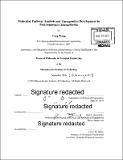Molecular pathway analysis and therapeutics development in post-traumatic osteoarthritis
Author(s)
Wang, Yang, Ph. D. Massachusetts Institute of Technology
DownloadFull printable version (17.96Mb)
Other Contributors
Massachusetts Institute of Technology. Department of Biological Engineering.
Advisor
Alan J. Grodzinsky.
Terms of use
Metadata
Show full item recordAbstract
Post traumatic osteoarthritis (PTOA) refers to the progressive degradation of cartilage often triggered by a traumatic joint injury, such as a tear of the meniscus or anterior cruciate ligament (ACL). Such impact injuries lead to elevated levels of inflammatory cytokines in the synovial fluid of the joint, including IL-1, IL-6, and TNFa. In turn, these cytokines cause decreased matrix synthesis by chondrocytes and contribute to reprogramming of chondrocytes and synovial cells to increase release of matrix proteases. PTOA accounts for 12% of the OA population and typically affects younger individuals. The first part of this thesis focuses on developing a combination therapeutic which can address multiple aspects of cartilage degradation associated with the pathogenic responses to joint injury. We studied the combined use of insulin-like growth factor 1 (IGF-1) and dexamethasone (Dex) to block multiple degradative effects of cytokine challenge to articular cartilage. We found that in young bovine cartilage, the combination of IGF- 1 and Dex significantly inhibited the loss of sulfated glycosaminoglycans (sGAG) and collagen induced by IL-I. rescued the suppressed matrix biosynthesis, and inhibited the loss of chondrocyte viability caused by iL- 1 treatment. In adult human cartilage, only IGF- 1 rescued matrix biosynthesis and only Dex inhibited sGAG loss and improved cell viability. Thus, the combination of IGF-1+Dex together showed combined beneficial effects in human cartilage. Our findings suggest that the combination of IGF-I and Dex has greater beneficial effects than either molecule alone in preventing cytokine-mediated cartilage degradation in adult human and young bovine cartilage. In the second part of this thesis, a global phosphoproteomics approach was employed to determine the pathways that are activated upon cytokine challenge of adult human chondrocytes. We identified key regulatory kinases, p38, JNKI/2, ERKI/2, ERK5, JAK2, and STAT3 that were upregulated in phosphorylation as a result of inflammatory cytokine treatment. In addition, we identified 417 phosphopeptides with MAPK substrate motif that were more than 4 times upregulated in response to cytokine treatment. Using inhibitors against the key kinases, it was shown that P38, JNK1/2, ERK5 played important roles in cytokine induced cell death in bovine and human cartilage, while inhibition of JNK1/2 and ERK5 had the anti-catabolic effect of reducing GAG loss from cartilage matrix. In addition, JNK inhibition sensitized chondrocytes to IGF-1 stimulation in young bovine cartilage. These result indicate that kinase activity plays an essential role in cytokine induced cartilage catabolism and that kinase inhibitors have therapeutic potential in preventing cartilage degeneration. The third and final part of this work examined the release of matrix molecules upon mechanical injurious compression and/or cytokine treatment in long term culture to identify potential biomarkers of cartilage degeneration. A quantitative mass spectrometry approach was used to characterize the kinetics of aggrecan and collagen degradation. Although mechanical injury alone does not lead to a substantial increase in matrix degradation, mechanical injury can accelerate cytokine-induced matrix degradation and release. Additionally, we found that a collagen type III neo-epitope could be a potential biomarker for cartilage degradation. A neoepitope of cartilage oligomeric matrix protein (COMP), which was identified in the synovial fluid of acute injury patients, was also found in our ex vivo explant injury model. This makes our model physiologically relevant and it can be a valuable system for determining the effects of potential drug treatment on matrix degradation.
Description
Thesis: Ph. D., Massachusetts Institute of Technology, Department of Biological Engineering, February 2017. Cataloged from PDF version of thesis. Includes bibliographical references.
Date issued
2017Department
Massachusetts Institute of Technology. Department of Biological EngineeringPublisher
Massachusetts Institute of Technology
Keywords
Biological Engineering.